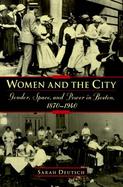Women and the City Gender, Space, and Space Boston, 1870-1940
- Binding: Hardcover
- Publisher: Oxford Univ Pr
- Publish date: 07/01/2000
Deutsch shows how the women of Boston turned the city from a prate with no respectable public space for women, to a city where women sat on the City Council and met their beaux on the street corners. The book follows the efforts of working-class, middle-class, and elite matrons, working girls and "new women" as they struggled to shape the city in their own interests. And in fact they succeeded in breathtaking fashion, rearranging and redefining the moral geography of the city, and in so doing broadening the scope of their own opportunities. But Deutsch reveals that not all women shared equally in this new access to public space, and even those who did walk the streets with relative impunity and protested their wrongs in public, did so only through strategic and limited alliances with other women and with men.
A penetrating new work by a brilliant young historian, Women and the City is the first book to analyze women's role in shaping the modern city. It casts new light not only on urban history, but also on women's domestic lives, women's organizations, labor organizing, and city politics, and on the crucial connections between gender, space, and power.
| Seller | Condition | Comments | Price |
|
HPB-Ruby
|
Very Good
|
$7.47
|
|
agoodealofbooks
|
Very Good
|
$7.47
|
|
Ergodebooks
|
Good |
$11.15
|
|
Gian Luigi Fine Books, Inc.
|
Very Good |
$13.45
|
|
Sapsucker Books
|
Very Good
|
$13.50
|
|
Abacus Bookshop
|
Like New
|
$14.06
|
|
Priceless Books
|
Very Good
|
$16.87
|
|
Ergodebooks
|
New |
$38.94
|
|
GridFreed
|
New |
$72.41
|


